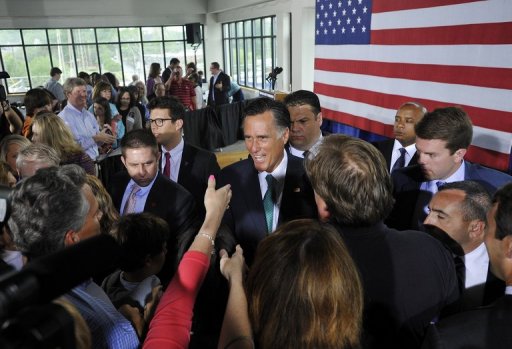He has been mocked as rich and out of touch, struggled to woo his own party, and left a trail of gaffes — but Mitt Romney still has a genuine shot to make Barack Obama a one-term president.
A cascade of new polls, uncertain economic data, and fresh concern that Europe’s woes could cross the Atlantic point to the Republican’s best chance of beating Obama in November — dismay about America’s slow economic recovery.
Though Obama is ahead by a nose despite the slowest recovery in decades, the president has little breathing room should the economy slow this year, as it did in 2010 and 2011.
Voters seem to like Obama more and believe he cares more about the middle classes, according to early polls ahead of the November 6 election.
So, should the rebound maintain a pace that has created around a million jobs over five months, and if Obama navigates sudden crises at home and abroad, he looks well placed with his approval rating approaching 50 percent.
Yet polls suggest voters are not yet feeling the economic recovery, or Obama’s strategy to create jobs — giving Romney a fungible, yet genuine opening.
A slowing of the pace of job creation to just 120,000 positions in March has fueled fears the recovery could be stalling. Europe’s woes are again worrying US investors.
Major polls now show the Romney and Obama matchup largely within the margin of error.
In a Wall Street Journal/NBC poll this week, Obama led Romney by 49 percent to 43 percent. The New York Times/CBS survey had them pegged at 46 percent and a Quinnipiac University poll had the president up 46 to 42 percent.
Polls suggest Romney has started to unite his party after a divisive primary fight and reveal America is still a nation split down the political middle.
Obama clearly has cause for concern over the economy.
Only 38 percent of those asked in the Journal poll thought the economy would get better in the next year, and the president’s economic approval rating was under water at 45 percent.
The Times poll had Obama’s approval rating on the economy at 44 percent. Quinnipiac had voters preferring Romney to deal with the economy, create jobs and bring down a spike in gasoline prices.
Romney’s campaign will try to widen that perception as it counters Obama’s “vision” of an economy that is fair for all, not just the wealthy.
Thomas Baldino, a professor of politics at Wilkes University, Pennsylvania, believes that if the election were held now, Romney could win, as many Americans simply do not feel their financial situation improving.
He warned that a torrent of advertising expected from Romney and allied special interest groups could shred Obama’s political message.
Romney has plenty to worry about too.
Though he leads Obama among white voters, he trails badly among the vital voting blocs of women and Hispanics — by margins that guarantee a loss if he cannot close the gap.
Romney has anchored his assaults against Obama on the economy under the slogan “Obama Isn’t Working.”
But if unemployment ticks down from the current 8.2 percent, Obama’s advantages elsewhere may be decisive.
The superior Obama campaign machine will meanwhile seek to exploit Romney’s reputation as a corporate raider who made a fortune, sometimes at the expense of other people’s jobs.
Obama is implicitly also attacking Romney’s wealth, campaigning for higher taxes on the rich as his surrogates demand his rival open his tax records for inspection.
Romney also starts from behind on the electoral map, which candidates mine for 270 electoral votes needed to be president.
Obama has more routes to victory, while Romney cannot afford to lose battlegrounds like Florida and Ohio and still hope to reach the White House.
And Romney must also conquer conventional wisdom, which doubts his skills as a candidate and chances of victory — a feeling that the Politico website reported Friday extends to members of his own Republican Party.

COMMENTS
Please let us know if you're having issues with commenting.